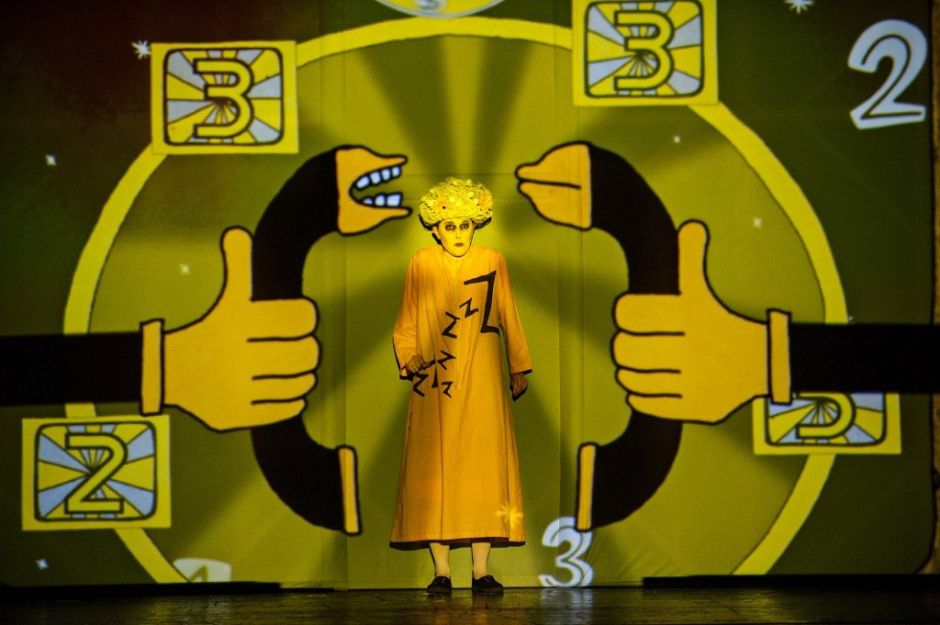Golem, HOME, First Street, Manchester, 7–17 October 2015
Memorable tunes, exquisite performances, and stunning visuals the likes of which I’ve not seen in theatre before. Produced by performance company 1927, whose speciality is combining performance and live music with animation and film, Golem is a wonderful spectacle – entertaining and funny with a subtext of social satire, exploring the ever-closing gap between man and machine, human being and human consumer.
The stage comprised of a large screen for a moving backdrop of stop-frame animation, claymation, illustration, collage and film created by the immensely talented Paul Barritt. In front of the screen sat the impeccable musicians – drummer Will Close and pianist/composer Lillian Henley – both of whom also took the roles of various characters. It is astounding to think that just five people made up the myriad cast, making quick changes and quick dashes throughout with amazing timing and precision. They also managed to close the divide between themselves and the digital backdrop, showing a level of sophistication elevating 1927’s production above other multimedia theatre shows I’ve seen. The actors sat comfortably in an animated living room, popped out of windows, interacted with clay robots and other animated ghouls. The lighting too, was alive onstage, a character dancing in time with the music and sometimes projected onto the actors, such as a spillage of absinthe represented by blue light illuminating the actor’s lap.
Written by Suzanne Andrade, Golem tells the story of Robert – a slightly geeky young man played deliciously by Shamira Taylor – who acquires a ‘Golem’ from a merchant in a seedy part of town (the moving cityscape was a constant delight, as was the boogie-woogie music that accompanied Robert’s slouchy walks to work). The Golem is, initially, a human-sized clay robot, though as with our own devices it gets smaller with each new version – the better to infiltrate Robert’s mind. Somewhat similar to Tony Hart’s Morph, Golem is depicted using claymation.
As a humorous comment on our increasingly digital society, Robert works at the Binary Codes Back-up Unit, where sharpened pencils frantically scribble 0s and 1s – “backing up the backup!” is one of many lines that still runs through my head. Robert takes his Golem to work, where he can now relax while the Golem does the menial work. Soon, we see an assembly line of Golems, with constant updates somehow magically occurring (wirelessly) to Robert’s increasing perplexity. Gradually, the Golem starts pointing out adverts to Robert and pushing him to be more successful, despite the fact that “Robert had never been ambitious”, as we’re told in voice-over. The Golem begins manipulating Robert’s decisions, from his clothes and purchases to his career and love-life – becoming a monster of popular rhetoric – “Say yes to progress!”.
Life speeds up for Robert – particularly funny is when he pours coffee on his face rather than drinks it – and he starts running to work, stopping to buy on the way, with the Golem pointing out shops and reciting adverts – “Say yes to next day delivery”. Robert also begins dating multiple women – “Go Courting!” – sacrificing his true love whom the Golem deems too old for him. But despite all this, we see evidence of resistance, such as intermittent visits to the rehearsal room for Robert’s punk-rock band. However, this too is gradually undermined – “Go Revolutionary Punk Band!” Rebellion commodified and subsumed into consumer society – the very society it is attempting to change!
The company 1927 takes its name from the year that talkies were introduced, and early-twentieth-century silent film and entertainment clearly influenced the aesthetics of the show, with past cultures superimposed onto the digital age, taking inspiration from Buster Keaton, German expressionism, British pier entertainment and more. I very much hope they will be bringing their two operas in development to HOME! There is only one criticism, and that is that perhaps the show was over-long, trailing ever so slightly to an indefinite ending. But the addictive music and clever humour more than made up for this and I would gladly watch it all over again. Say yes to Golem!
Emma Rhys

